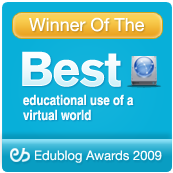E-learning and Digital Cultures was a 12-week course taught by me and Siân Bayne as part of the MSc in E-learning programme. It was innovative for the programme because of the nature of its engagement with digital cultures: it was open-access and disaggregated (you can see for yourself by browsing the web site), and made use of blogs, lifestreaming, twitter and a range of social and user-generated tools from across the web.
We’ll be presenting a paper at the Academic Identities for the 21st Century conference at Strathclyde University in June called “Posthuman academic identities in digital environments”, drawing on Siân’s recent work on uncanny digital pedagogies to talk about some of what we’ve learned from this course: how to work productively with volatility, disorientation, and strangeness.



